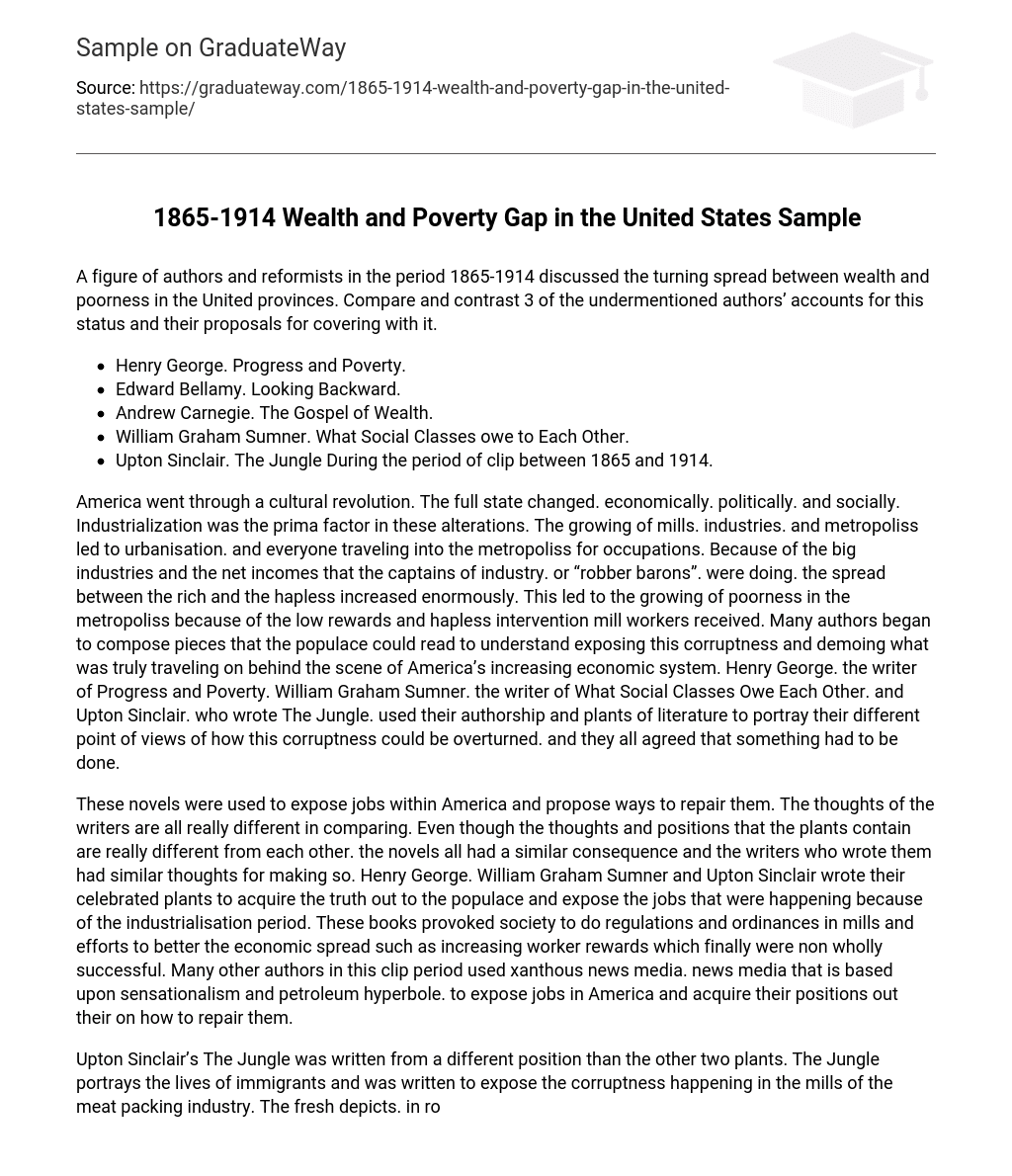A figure of authors and reformists in the period 1865-1914 discussed the turning spread between wealth and poorness in the United provinces. Compare and contrast 3 of the undermentioned authors’ accounts for this status and their proposals for covering with it.
- Henry George. Progress and Poverty.
- Edward Bellamy. Looking Backward.
- Andrew Carnegie. The Gospel of Wealth.
- William Graham Sumner. What Social Classes owe to Each Other.
- Upton Sinclair. The Jungle During the period of clip between 1865 and 1914.
America went through a cultural revolution. The full state changed. economically. politically. and socially. Industrialization was the prima factor in these alterations. The growing of mills. industries. and metropoliss led to urbanisation. and everyone traveling into the metropoliss for occupations. Because of the big industries and the net incomes that the captains of industry. or “robber barons”. were doing. the spread between the rich and the hapless increased enormously. This led to the growing of poorness in the metropoliss because of the low rewards and hapless intervention mill workers received. Many authors began to compose pieces that the populace could read to understand exposing this corruptness and demoing what was truly traveling on behind the scene of America’s increasing economic system. Henry George. the writer of Progress and Poverty. William Graham Sumner. the writer of What Social Classes Owe Each Other. and Upton Sinclair. who wrote The Jungle. used their authorship and plants of literature to portray their different point of views of how this corruptness could be overturned. and they all agreed that something had to be done.
These novels were used to expose jobs within America and propose ways to repair them. The thoughts of the writers are all really different in comparing. Even though the thoughts and positions that the plants contain are really different from each other. the novels all had a similar consequence and the writers who wrote them had similar thoughts for making so. Henry George. William Graham Sumner and Upton Sinclair wrote their celebrated plants to acquire the truth out to the populace and expose the jobs that were happening because of the industrialisation period. These books provoked society to do regulations and ordinances in mills and efforts to better the economic spread such as increasing worker rewards which finally were non wholly successful. Many other authors in this clip period used xanthous news media. news media that is based upon sensationalism and petroleum hyperbole. to expose jobs in America and acquire their positions out their on how to repair them.
Upton Sinclair’s The Jungle was written from a different position than the other two plants. The Jungle portrays the lives of immigrants and was written to expose the corruptness happening in the mills of the meat packing industry. The fresh depicts. in rough tones. poorness. the absence of societal plans. unpleasant life and on the job conditions. and the hopelessness prevalent among the working category. which is contrasted with the deeply-rooted corruptness on the portion of those in power. This book was used more as a tool to acquire society to cognize of the corruptness and promote them to work to work out the corruptness jobs and the economic jobs.
William Graham Sumner had a different thought. In his work What the Social Classes Owe Each Other. he saw that the premise of group duty was destined to be the force behind clear societal direction in the hereafter. He said that “Capital owes labour. the rich owe the hapless. manufacturers owe consumers. one sex owes another. one race owes another. this state owes that state. and so on and infinitum. ” He believed that the spread job could be easy solved with province intercession and group cooperation.
During the clip period 1865-1914. a immense rush towards industrialisation occurred in America. This alteration to America going a more industrialised state had effects on other facets of the state other than merely the economic system. A big addition in urbanisation occurred. taking to over population in the metropoliss. Because of the big industries and the net incomes that the captains of industry were doing. the spread between the rich and the hapless increased enormously. Poverty was going really common in the metropoliss because of the low rewards and hapless intervention mill workers received. To expose this corruptness. many authors wrote pieces that the populace could read to understand what was truly traveling on behind the scene of America’s increasing economic system. Henry George. the writer of Progress and Poverty. William Graham Sumner. the writer of What Social Classes Owe Each Other. and Upton Sinclair. who wrote The Jungle. all believed that serious Reconstruction was needed to repair the increasing spread between the wealthy and the hapless and used their plants of literature to show their different positions on how to make so.





